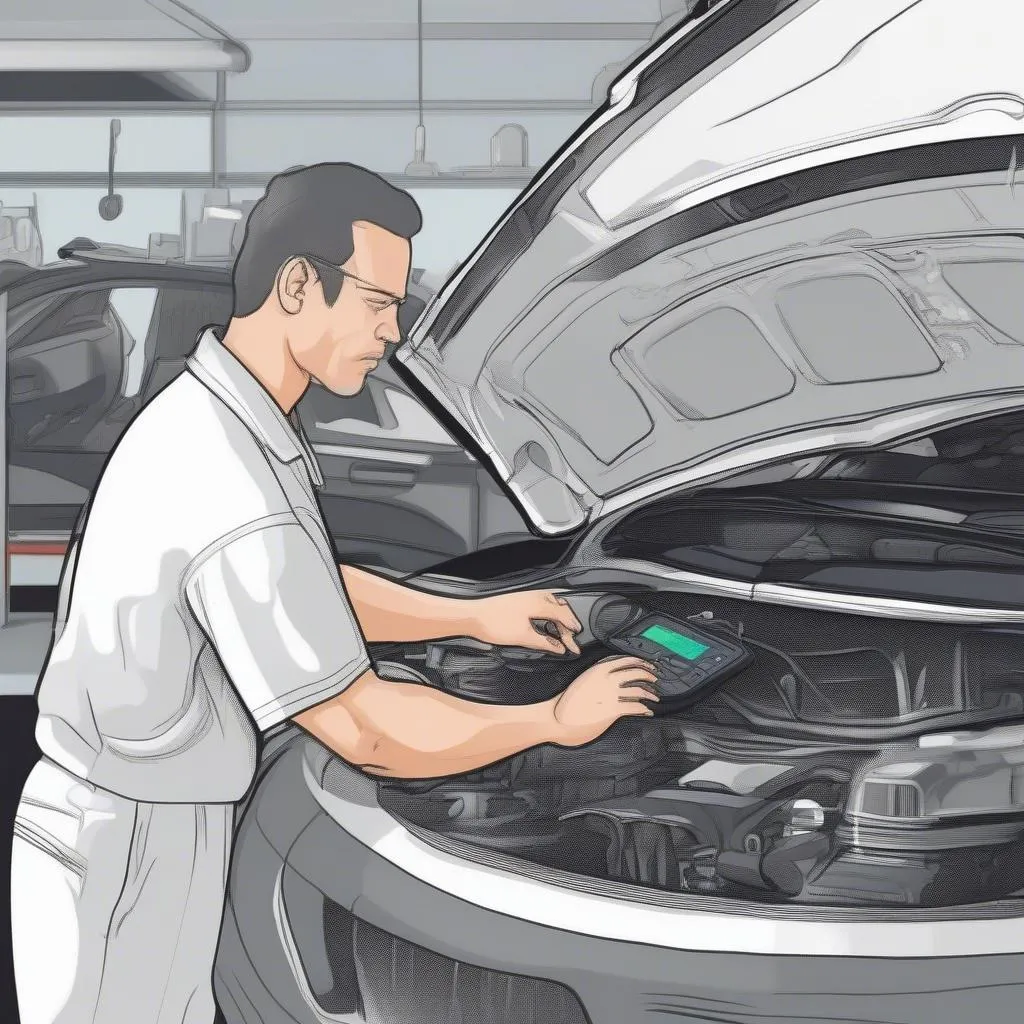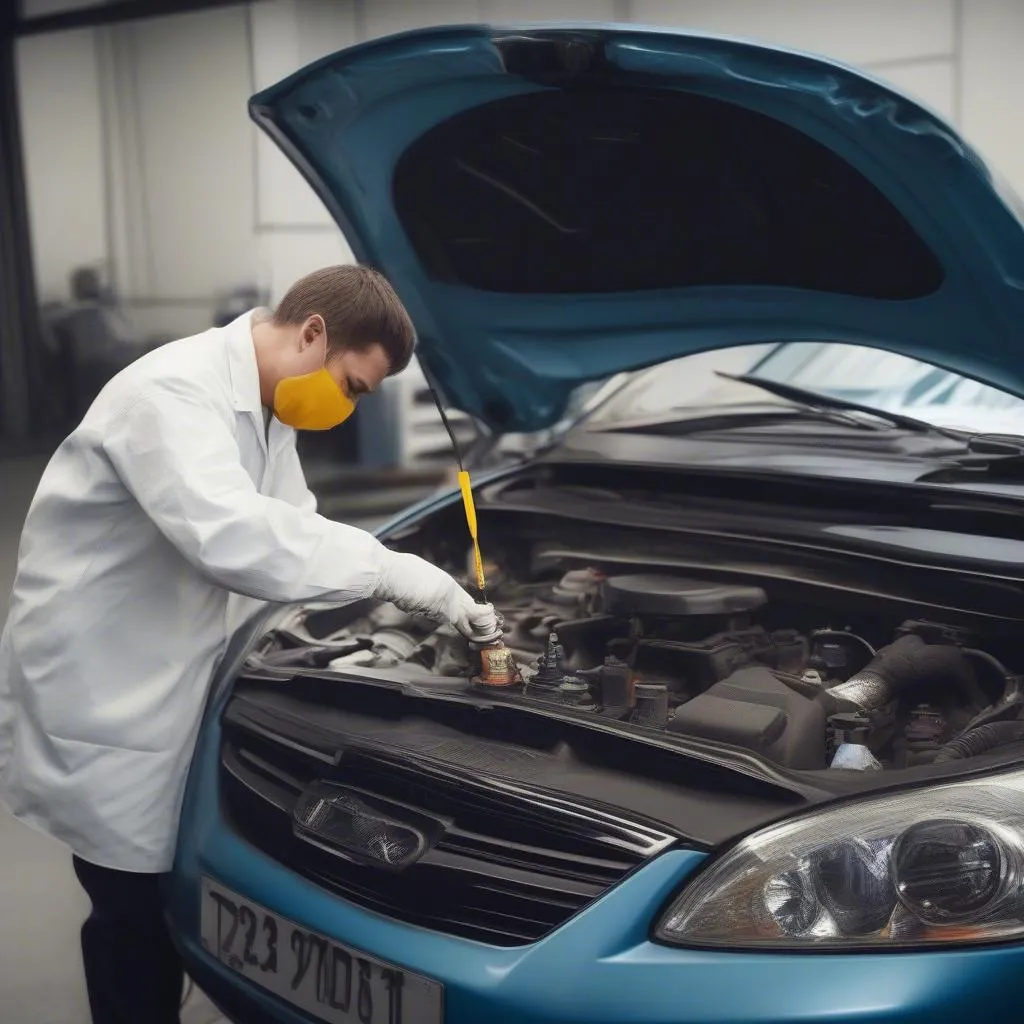“My check engine light just came on, and this code reader says it’s P0430. What does that even mean?”
Sound familiar? It’s a common scenario for many GM owners. That cryptic code, P0430, has a way of striking fear into the hearts of even seasoned car enthusiasts. But fear not, this guide is here to break down the mystery of the GM OBD code P0430 and arm you with the knowledge to tackle it head-on.
What Does P0430 Really Mean?
Let’s cut to the chase. The P0430 code signals a problem with your vehicle’s catalytic converter system, specifically on Bank 2. In simpler terms, your car’s emission control system isn’t working as efficiently as it should.
Let’s break it down further:
- OBD: Stands for On-Board Diagnostics, your car’s internal computer system.
- P0430: The specific code indicating an issue with Catalyst System Efficiency below threshold (Bank 2).
- Bank 2: Refers to the side of the engine that doesn’t contain cylinder #1.
Why Should You Care About P0430?
Beyond the annoyance of a glowing check engine light, ignoring a P0430 code can lead to:
- Decreased fuel efficiency: A malfunctioning catalytic converter can wreak havoc on your gas mileage.
- Failed emissions tests: Say goodbye to renewing your registration if your car can’t pass emissions.
- Costly repairs: Addressing the issue now is always better (and cheaper) than dealing with a complete catalytic converter replacement down the line.
” I once had a client, John, from Chicago, come in with a P0430 code he’d ignored for months,” shares David Miller, a seasoned mechanic at a Chevrolet dealership in St. Louis. “Not only was his fuel economy abysmal, but the neglected issue ultimately led to a hefty repair bill exceeding $1000.”
Decoding the Causes: Why is My GM Throwing a P0430?
A P0430 code can be triggered by several culprits. Here are the usual suspects:
- Faulty Oxygen Sensors: These sensors act like your car’s emissions detectives, monitoring exhaust gases. Malfunctioning sensors can send inaccurate data, leading to a false P0430 code.
- Exhaust Leaks: Even a tiny leak before the catalytic converter can disrupt exhaust flow and trigger the code.
- Catalytic Converter Failure: While less common, the catalytic converter itself can fail due to age, damage, or contamination from engine oil or coolant leaking into the exhaust system.
Diagnosing the Problem Like a Pro
Now that you know the potential culprits, here’s how to get to the bottom of your P0430:
- Check for Engine Codes: Start by retrieving all diagnostic trouble codes using an OBD-II scanner.
- Inspect for Exhaust Leaks: Thoroughly examine your exhaust system for any signs of leaks, cracks, or damage.
- Test Oxygen Sensors: If you suspect a faulty oxygen sensor, have them tested at a reputable auto shop.
- Consider a Professional Diagnosis: If you’re still scratching your head, it’s best to consult a qualified mechanic specializing in GM vehicles. They have the expertise and specialized equipment to pinpoint the exact cause.
** obd2 scanner
obd2 scanner
Tackling the P0430 Code Head-On: Your Options
Once you’ve identified the root cause, it’s time to take action. The solution will depend on the culprit, ranging from simple fixes like replacing a faulty oxygen sensor to more involved repairs like addressing exhaust leaks or replacing the catalytic converter.
Preventing Future P0430 Headaches: Maintenance is Key
Like most car problems, prevention is always better than cure. Here’s how to keep your GM running smoothly and avoid that dreaded P0430:
- Regular Maintenance: Stick to your car’s recommended maintenance schedule, including timely oil changes and spark plug replacements.
- Quality Fuel: Using high-quality fuel can help prevent catalytic converter contamination.
- Address Engine Issues Promptly: Ignoring engine problems, like misfires or oil leaks, can damage your catalytic converter over time.
** car maintenance
car maintenance
Frequently Asked Questions About the GM OBD Code P0430
Can I still drive my car with a P0430 code?
It’s not recommended to ignore a P0430 code for extended periods. While driving short distances might be possible, prolonged driving can worsen the underlying issue and lead to more expensive repairs.
How much does it cost to fix a P0430 code?
The repair cost depends on the underlying cause. A simple oxygen sensor replacement can be relatively affordable, while a catalytic converter replacement can be significantly more expensive.
Can a bad catalytic converter damage my engine?
While a bad catalytic converter won’t directly damage your engine, it can lead to decreased performance, reduced fuel economy, and potential engine damage down the line if left unaddressed.
Need More Help With Your GM OBD Codes?
Dealing with car trouble can be frustrating, especially when those cryptic codes pop up. If you need assistance deciphering your GM’s OBD codes or require expert help with diagnostics and repairs, don’t hesitate to reach out to our team of automotive specialists.
Contact us on Whatsapp at +84767531508 for 24/7 support. We’re here to help you get back on the road with confidence!
Keep Exploring: Related Car Care Resources
For more insights into common car problems and solutions, check out our other informative articles:
- Understanding Your Car’s On-Board Diagnostic System
- Troubleshooting Common Check Engine Light Codes
- Dodge Journey 2013 OBD
Don’t let car troubles slow you down. Arm yourself with knowledge and get back to enjoying the open road!
